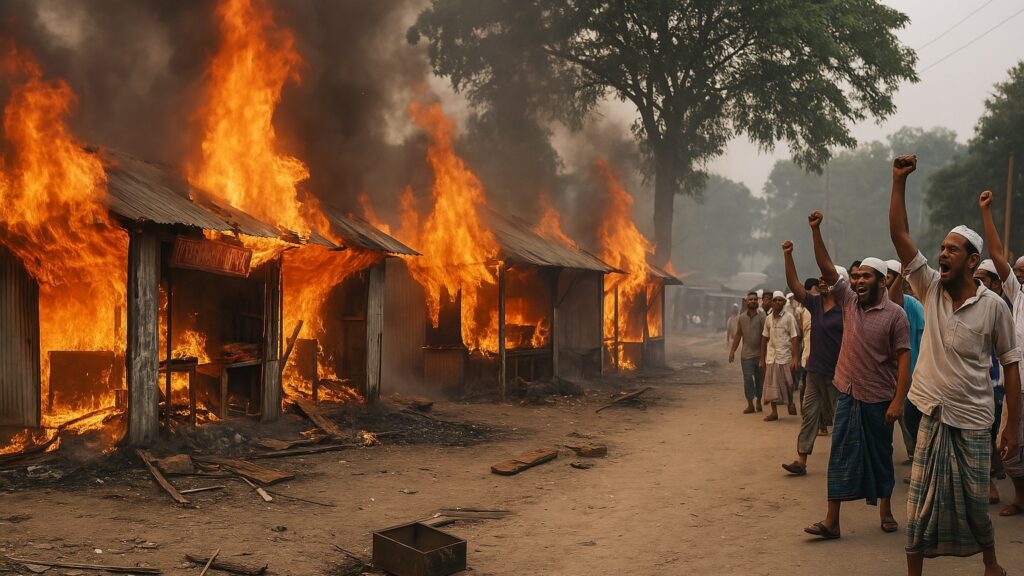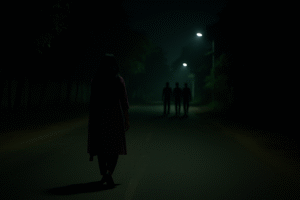A Fiery Assault in Mahishadanga
On the afternoon of April 6, 2025, a mob of local residents – identifying themselves as “Tawhidi Janata” or devout masses – descended on a cluster of roadside eateries in Kushtia Sadar upazila and unleashed violence. Around 4 p.m., they vandalized three small food hotels and a tea stall in the Mahishadanga-Bittipara area, then set them ablaze. The attackers justified the arson as an act of “moral cleansing,” alleging that the establishments were fronts for prostitution involving their female staff Flames and smoke soon billowed from the flimsy tin-shed eateries as onlookers watched in shock. Police arrived to find charred remains and an irate crowd, bringing the situation under control by early evening
Timeline of the Attack
According to witnesses and news reports, trouble had been brewing at the 11-mile junction on the Kushtia-Jhenaidah highway throughout that Sunday. In the late afternoon, a group of locals – including some youths from a nearby student organization – gathered to protest alleged “anti-social activities” at the highway eateries. Chanting slogans, they first smashed furniture, dishes, and the flimsy walls of the targeted hotels, then doused parts of the structures in fuel and set them on fire Within minutes, three roadside hotels were reduced to ashes along with an adjacent tea shop, their tin roofs and bamboo frames collapsing into smoldering piles.
“It happened so fast – they broke everything and lit the fires in a frenzy,” said one bystander who runs a nearby stall, requesting anonymity. By the time police reached the remote spot off the highway, the mob had mostly dispersed, leaving behind stunned residents and terrified workers who fled the scene. Officers worked to douse the embers and prevent further escalation. No casualties were reported, but the material damage was complete.
Who Are the ‘Tawhidi Janata’?
The assailants called themselves Tawhidi Janata, loosely meaning “people of monotheism” – a phrase increasingly adopted by Islamist vigilante groups in Bangladesh. Over recent weeks, self-styled Tawhidi Janata cadres have disrupted events and attacked venues they deem un-Islamic or immoral. In this case, the label was invoked by villagers who took it upon themselves to enforce what they saw as moral order. Residents of Mahishadanga recount that the mob included several students from a local Islamist student group and other young men from the area.
Notably, an activist named Shanto Islam of the “Anti-Discrimination Student Movement” – an organization locally active in social issues – later claimed credit on social media for leading a “raid” on the hotels that day . This hints that the attack was not entirely spontaneous; rather, it was galvanized by organized vigilantes motivated by a mix of religious fervor and populist outrage. The term Tawhidi Janata has been used in the past by hardline groups and even at times co-opted by political actors, blurring the lines between genuine grassroots piety and orchestrated extremism . In the conservative social climate of Kushtia, such banners lend moral legitimacy to mob action – allowing attackers to portray themselves as righteous crusaders rather than criminals.
Allegations of Immorality Behind Closed Doors
The stated trigger for the violence was a claim that these roadside hotels doubled as brothels. Locals had long whispered that behind the curtained off dining areas, illicit sex work was being arranged for travelers. “There were allegations that under cover of the food business, rampant prostitution was going on with women in those hotels,” reported a Kushtia news correspondent of Risingbd. The targeted eateries – modest one-story establishments with names like Bhai Bhai Hotel and Sekender’s Hotel – cater to truck drivers and highway passengers who stop for cheap rice meals and tea. Most of the establishments employed a few women as serving staff or cooks. According to the vigilantes, these women were in fact sex workers soliciting clients on the premises, and the hotel owners were operating a clandestine brothel under the guise of a restaurant.
Local resentment had been simmering. Residents complained that over the past two years, a cluster of about 50 such hotels sprang up along the highway from the “11 Mile” point up to Bittipara, and that at least “6–7 of these hotels” were openly engaged in sex trade, “evading the eyes of the administration” . Parents in nearby villages grew alarmed, claiming local youths were being corrupted. “Our young generation was getting spoiled,” insisted Kamal Hossain, a Mahishadanga resident. “This immoral business was happening right under the administration’s nose with no action taken” . By his account, the community had repeatedly warned the hotel owners to stop the illicit activities. “We told them many times to end the immoral acts, but they wouldn’t listen,” Kamal said. Frustration peaked that Sunday, leading the mob to take matters into its own hands. From the vigilantes’ perspective, the arson was the dramatic climax of a long-brewing fight to “clean up” their neighborhood.
The Targeted Hotels and Their Workers
All four destroyed establishments were small, family-run businesses. The owners – identified as Shekam Mondal, Jahangir Mondal, Harun Biswas, and Wahed Ali – are locals who had been running these roadside hotels for years . They typically served basic fare like rice, lentils, and curry to drivers and day laborers for a few dozen taka per meal. To cut costs and attract clientele, some owners had hired women from low-income backgrounds to work as waitresses or cleaners, a practice still uncommon in rural highway eateries. Those female employees, mostly middle-aged, became the center of controversy. Conservative locals viewed their very presence at the hotels with suspicion. “Women workers were employed there, so [the vigilantes believed] obscene acts must be happening,” said a Kushtia journalist, explaining the mob’s mindset.
However, the women themselves mostly lived quiet, hidden lives and were not publicly known to engage in sex work. Several of them were widows or divorcees with no other livelihood, according to a neighbor. The hotels provided these women with modest wages, meals, and a degree of financial independence. Now, after the attack, these women have lost their jobs and face stigma due to the prostitution allegations. “We only served food and tea,” one former waitress said softly to a reporter, insisting she was not involved in any illicit trade. Her statement couldn’t be independently verified, but it underscores the vulnerability of these women – attacked and unemployed overnight, tarred by unproven claims of “immorality.”
Conflicting Narratives in the Community
Strikingly, not everyone in the community agrees that prostitution was taking place. While many applaud the mob action, some locals flatly deny the allegations against the hotels. “There was no prostitution happening at these hotels as alleged,” said Abdullah, a rickshaw puller who frequented one of the eateries . As a regular customer, Abdullah claims he only ever saw truck drivers stopping for meals and tea. He and a few others believe the narrative of rampant sex trade was exaggerated or fabricated to justify the attack. Their skepticism has given rise to alternate theories about why the hotels were targeted.
Some residents quietly suspect that the “immorality” complaint was a pretext for ulterior motives like extortion or control of the lucrative highway business. “We think certain people wanted to drive out the current owners and take over the trade,” a local shopkeeper told, requesting anonymity due to fear of reprisal. Indeed, the attacked businesses occupied prime spots along a busy highway. With hundreds of trucks passing daily, even a simple rice hotel can earn steady income. There are murmurs that an influential clique had demanded monthly “protection money” from these hotel owners – and when payments were refused, they orchestrated the mob to oust them under the guise of religious morality. These claims of extortion and business rivalry have not been proven, but they reflect a deep cynicism among some residents about the true catalyst of the violence. Notably, when asked about possible ulterior motives, the victimized hotel owners themselves refused to comment or could not be reached, perhaps out of fear or caution.
Role of Religious Extremism and Moral Policing
The attack in Kushtia Sadar is part of a worrying pattern of moral policing fueled by extremist interpretations of Islam. The self-described Tawhidi Janata involved in this incident justified their vigilante action through religious rhetoric – framing it as an effort to uphold societal morals and prevent vice. Similar mobs under the Tawhidi Janata banner have recently targeted events like Urs (Islamic spiritual gatherings) and even women’s sports competitions across Bangladesh, calling them un-Islamic. Hardline Islamist organizations, such as Hefazat-e-Islam, have in the past rallied local crowds using such slogans, and their influence appears to be permeating grassroots levels.
In this conservative region, the mere accusation of “unsocial” or un-Islamic behavior can ignite public fury. The presence of women in a public-facing role – working at a hotel frequented by men – was enough for some to cry scandal. Religious leaders in the area had reportedly expressed concern during Friday sermons about “indecency” on the highway, implicitly fanning the flames. It’s a classic recipe for vigilantism: combine economic frustrations, rumors of moral deviance, and a call to religious duty, and a mob may not be far behind. While devout residents genuinely worried about moral decay, extremist elements skillfully harnessed those worries into organized aggression.
Human rights observers note that such incidents have a chilling effect on women’s freedom and livelihood, as well as on overall communal tolerance. The labeling of the mob as “Tawhidi Janata” itself signals how religious identity was used as both shield and sword – to protect the perpetrators from criticism (“we are just pious commoners”) and to attack those deemed sinners.
Police Response and Investigation
Law enforcement was caught in a bind – accused of inaction before the incident, and scrambling to respond after. Officers from Islamic University (IB) Police Station arrived at Mahishadanga shortly after the arson, but by then the damage was done. Police had long been aware of the allegations of sex work at these highway hotels. In fact, just days earlier they had conducted raids and arrested four women from some of these establishments, sending them to court custody. “For nearly two years, open immoral activities were running there,” one police source admitted, “We even warned the hotel owners several times and only a few days ago detained four people”.
The local station chief, Officer-in-Charge (OC) Mehedi Hasan, confirmed the community’s complaints: “There are a number of food hotels in the fields of Mahishadanga-Bittipara. Truck drivers and helpers eat there. On allegations of prostitution under the guise of those hotels, some local people vandalized and set fire to three or four hotels. Upon news, a police team went to the spot. We are investigating the matter. The situation is now under control.”.
Crucially, police have promised to identify and hold accountable those who led the mob. OC Mehedi Hasan stated that CCTV footage from the area (likely from nearby shops or traffic cameras) was being reviewed to pinpoint the culprits behind the vandalism and arson . As of April 8, no arrests of perpetrators had been announced, but authorities say a case has been filed and suspects are being tracked. This tepid follow-up fuels local speculation that the vigilantes might enjoy political patronage or at least tacit support from powerful quarters. The police, meanwhile, face criticism for failing to prevent the violence despite prior knowledge of tensions. It is a damning irony that officers had cracked down on the alleged sex workers (arresting several in preceding days) but could not forestall an extrajudicial attack on the establishments. Rights advocates argue this exposes a gap in protecting citizens’ safety and rule of law – the state acted against the purported “immorality” but not against the unlawful violence carried out in religion’s name.
Fallout for the Vulnerable: Women and the Poor
The aftermath of the incident has left a trail of economic and social devastation, especially for low-income people. The women who worked at the burned hotels are now jobless and fearful. Having already been stigmatized by allegations of prostitution, they worry they will be unwelcome or unsafe if they seek similar work elsewhere. “Who will hire us now? People look at us like we are bad women,” one of the displaced workers said in tears. For these women – some sole breadwinners for their families – the vigilante justice delivered a cruel punishment without trial. If any were indeed engaging in sex work, they did so out of desperation; now even that meager livelihood is gone, and they may be driven deeper into poverty or peril. Local human rights groups have expressed concern that the attack further victimized women who were potentially being exploited to begin with.
The small business owners themselves have lost everything in the blink of an eye. Standing amid the ashen ruins of what was once his roadside hotel, one owner could only lament, “I invested all my savings here. Now it’s burnt to the ground”, before breaking down. These men face not only financial ruin but also possible legal action if evidence of prostitution at their establishments comes to light. None of the four proprietors agreed to speak on record to the press after the incident, underscoring their precarious position . Neighbors say at least two of the owners left the area, fearing arrest or retaliation. Dozens of ancillary workers – from dishwashers to day laborers who supplied the hotels – also lost their source of income overnight.
For the wider community of Mahishadanga-Bittipara, the incident is a double-edged sword. On one hand, some celebrate the purge of an alleged vice den – one local imam even praised the “ghairat” (moral zeal) of the youth in his Friday sermon. On the other hand, many low-income residents who depended on the cheap eateries for daily meals are now left with fewer options. Truck drivers who regularly stopped at the 11-mile marker must find new rest stops further away. The arson has thus disrupted a micro-economy that served poor travelers and locals alike. What was once a bustling if seedy roadside marketplace has become a charred void patrolled by police.
Suspicions of Political and Financial Motives
As the dust settles, questions are being raised about whether something more than religious fervor was at play. Some community members and independent observers suspect that local power politics or extortion rackets may have piggybacked on the moral outrage. The Daily Sun, an English-language newspaper, pointedly asked in an editorial: “AL behind ‘Tawhidi Janata’ mask?”, implying that factions of the ruling Awami League could be covertly backing these vigilante actions for political gain. The rationale for such claims stems from a pattern: the recent spike in Tawhidi Janata mobilizations coincides with a pre-election period, raising the possibility that extremist vigilantism is being tolerated or even instigated to appease religious constituencies or to harass local businesses not aligned with the ruling bloc. While there is no concrete evidence tying the Kushtia incident to any political party, the timing and impunity suggest that the mob felt confident of protection. It would not be the first time in Bangladesh that thuggish elements donned a religious cloak to settle scores or grab assets.
Locals have pointed out that land value along the highway has been rising, and controlling the 11-mile junction could be economically strategic. The attacked hotels sat on roadside public land or private plots whose ownership is murky. There are unconfirmed murmurs that a proposal for a larger highway service center or truck stop was making rounds, and certain influential persons wanted the small hotel owners out of the way. “They want to clear out the small players and build something bigger there,” speculated a resident, noting that none of the vigilantes touched a nearby plot owned by a well-connected individual. Additionally, multiple sources mention an “extortion ecosystem” on the highway: local toughs often demand weekly payments from shops and eateries. Failure to pay can invite threats or sabotage. In this context, branding the hotels as dens of sin could have been a convenient way to eliminate defiant owners and intimidate others into compliance. As one civil society activist put it, “It’s a perfect cover – who is going to defend a place accused of prostitution? You can destroy it and call yourself a hero.”
Ongoing Investigations and the Road Ahead
The Kushtia district authorities have formed a committee to investigate the incident, vowing to examine both the veracity of the prostitution claims and the culpability of the attackers, although skeptics question how impartial this inquiry will be. Human rights organizations are urging a balanced approach: “If there was sex trafficking or exploitation of women, that needs to be addressed by law – but under no circumstances can mob violence be excused,” said a representative of a Dhaka-based rights NGO. There is also the larger issue of vigilantism threatening the rule of law. Today it is hotels and alleged sex workers; tomorrow it could be religious minorities or anyone deemed deviant by self-appointed moral guardians.
Meanwhile, on the ground in Mahishadanga, a tense quiet prevails. Police patrols have been increased on the highway stretch, and officials say the burned plots will remain under watch to prevent any reoccupation for now. For the families affected – the women who worked in the hotels, the owners, and the employees – the future is uncertain. No compensation has been announced for their losses, given the informal (and partly illicit)
nature of their businesses. Social workers fear that the incident will drive the sex trade underground, making it even riskier for women, or displace it to other villages. The underlying demand for such services among transient workers has not vanished, after all, and without structural solutions, the problem may resurface elsewhere.
As the embers cool, the Mahishadanga arson case stands as a stark illustration of what can happen when poverty, patriarchal morality, and lawlessness collide. It highlights the plight of marginalized women caught between exploitation and extremist “justice,” and raises tough questions about the state’s ability to protect its most vulnerable citizens. Was this the righteous purging of a neighborhood scourge, or a dangerous precedent of mob rule? For now, the answer depends on whom you ask in Kushtia – and whether they have the freedom to speak their truth.
Sources: (খাবারের হোটেলের আড়ালে অনৈতিক কর্মকাণ্ড, আগুন দিল জনতা) (নারী কর্মচারীরা কাজ করেন তাই ৩টি খাবার হোটেলে আগুন তৌহিদি জনতার) (Tauhidi Janata sets fire to 3 food hotels employing female workers in …) (Tauhidi Janata sets fire to 3 food hotels employing female workers in …) (ভাতের হোটেলের আড়ালে যৌনতা, পুড়িয়ে দিলেন এলাকাবাসী) (কুষ্টিয়ায় হাইওয়ে খাবার হোটেল ব্যবসার আড়ালে দেহ ব্যবসা, আটক ৪)(হোটেলের আড়ালে নারীদের দিয়ে অনৈতিক কর্মকাণ্ড, আগুন দিল জনতা). (ভাতের হোটেলের আড়ালে যৌনতা, পুড়িয়ে দিলেন এলাকাবাসী) (আবাসিক হোটেল ভাঙচুর, অগ্নিসংযোগ | | বাংলাদেশ প্রতিদিন)
Publication Date: 08 April, 2025
এই আর্টিকেলটি বাংলায় পড়তে চাইলে এখানে ক্লিক করুন







